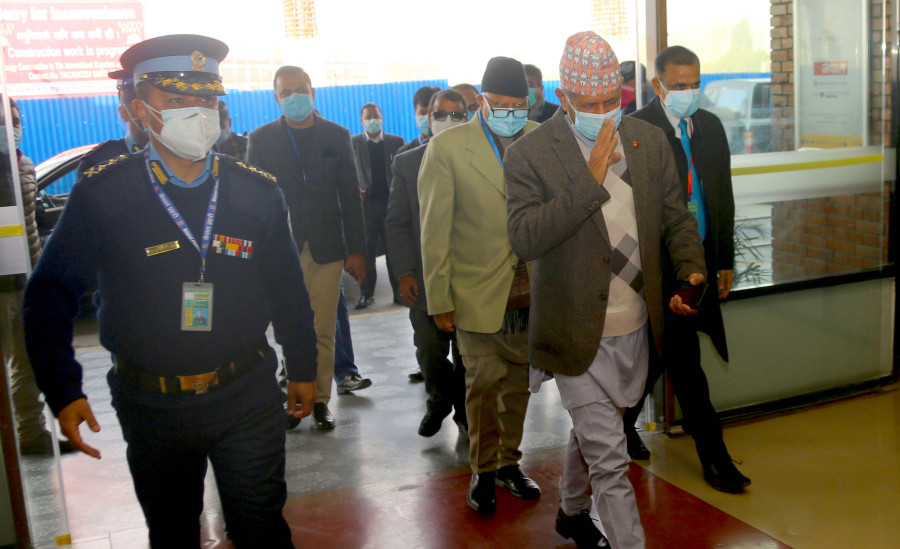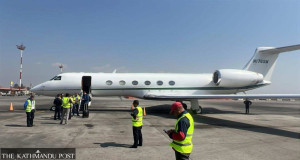National
As Gyawali lands in Delhi, India hints boundary talks unlikely
Joint Commission and boundary talks are two different mechanisms, says Indian Ministry of External Affairs, even as Nepal keeps the territory issue high on agenda.
Suresh Raj Neupane
In what could be a major setback for the KP Sharma Oli government, India has indicated that boundary talks are unlikely during Foreign Minister Pradeep Gyawali’s New Delhi visit.
Gyawali arrived in the Indian capital on Thursday to participate in the Sixth Meeting of the India-Nepal Joint Commission, a high-level mechanism that deals with the entire gamut of bilateral relations.
The boundary issue is high on the agenda, but as soon as Gyawali landed in New Delhi, India’s Ministry of External Affairs reiterated India’s position on the boundary row.
“Our position on the boundary issue is well known,” Anurag Srivastava, spokesperson for India’s Ministry of External Affairs, said during a regular press briefing on Thursday. “The joint commission and boundary talks are two different mechanisms.”
Responding to queries on Gyawali’s visit to Delhi, Srivastava said: “The foreign minister of Nepal arrived in New Delhi a short while ago. He is here to co-chair the sixth session of the India-Nepal Joint Commission meeting. This meeting will be hosted by the external affairs minister tomorrow.”
“The joint commission is an important mechanism. It provides an opportunity for reviewing at high level the entire gamut of our bilateral partnership and to provide political guidance to further enhance the special and unique ties that exist between our two countries. We look forward to constructive discussions on the numerous sectors that encompass our bilateral agenda.”
Gyawali’s is the first high level visit to Delhi from Kathmandu in over a year which saw bilateral ties hitting a rock bottom.
Relations between Nepal and India started to deteriorate in November 2019 after Delhi published a new map including Kalapani within India’s territories.
New Delhi cold-shouldered Kathmandu’s call for diplomatic dialogue. Instead, in May last year, India opened a road link via Lipulekh to Kailash Mansarovar in the Tibet Autonomous Region of China. In response, Nepal published its own political map depicting Kalapani, Lipulekh and Limiyadhura as parts of the Nepali territory.
Both countries entered a state of cartographic war.
After Nepal protested against India’s inclusion of Kalapani within its borders, Delhi had said the Indian political map “accurately depicts the sovereign territory of India”.
“The new map has in no manner revised our boundary with Nepal,” said Raveesh Kumar, who was the spokesperson for India's Ministry of External Affairs, at a regular press briefing on November 7, 2019. “The boundary delineation exercise with Nepal is ongoing under the existing mechanism.”
After Nepal published the new political map depicting Kalapani, Lipulekh and Limpiyadhura within its borders, Delhi called the move “cartographic assertion”.
"The Government of Nepal has released a revised official map of Nepal today that includes parts of Indian territory. This unilateral act is not based on historical facts and evidence,” said Srivastava on May 20 last year. “It is contrary to the bilateral understanding to resolve the outstanding boundary issues through diplomatic dialogue.”
The ties between the two countries then nosedived.
Bilateral relations started to return to normalcy after Delhi made some moves to effect a rapprochement with Kathmandu.
The stage for Gyawali’s visit to Delhi was set after India sent its foreign spy chief, Samant Goel, in October. Goel’s visit was followed by the visits of Indian Army chief MM Naravane and Indian Foreign Secretary Harsh Vardhan Shringla.
The Indian Ministry of External Affairs’ indication that boundary talks are unlikely during Gyawali’s stay in Delhi comes as a setback for Prime Minister KP Oli who has once again ratcheted up his nationalist rhetoric after dissolving the House and declaring snap polls.
Gyawali, however, said he was unaware of the Indian External Affairs Ministry’s statement.
“I am not aware of India’s statement. So I cannot comment on this” Gyawali told the Post. “But this [joint] commission is for discussing all bilateral issues, including the boundary.”
Sources told the Post that New Delhi has not agreed to include the boundary dispute in the official agenda, saying that the issue should be dealt with by the foreign secretary level mechanism.
The foreign secretary level mechanism between the two countries is tasked with resolving the disputes concerning Susta and Kalapani.
In November last year, during Shringla’s visit to Kathmandu, India, however, had refused to include the boundary dispute in the official agenda.
Srivastav’s statement on Thursday also contradicts the statement issued by the Ministry of Foreign Affairs on Tuesday, in which it said the Joint Commission will discuss, among other things, the boundary issue.
The meeting of the Joint Commission will discuss the whole gamut of Nepal-India relations, including trade, transit, energy, boundary, Covid-19 cooperation, infrastructure, connectivity, investment, agriculture, tourism and culture, the ministry stated.
Observers in Kathmandu had told the Post on Wednesday that since Gyawali is visiting Delhi at a time when there is a political crisis in Nepal, talks are likely to revolve more around the political situation, even though Nepal was hoping for boundary talks with India.
An official at the Nepali Embassy in New Delhi said that issues related to political ties, energy cooperation, border security, connectivity, trade, transit and cooperation in the railway sector will be discussed.
“The meeting will also review the progress made by different mechanisms in the past,” said the official who spoke on condition of anonymity.
Ahead of the Joint Commission meeting, Foreign Minister Gyawali will hold one-on-one talks with his Indian counterpart S Jaishankar.
An announcement on India’s Covid-19 vaccine support is likely, according to officials familiar with the preparations.
Two Indian companies have manufactured Covid-19 vaccines and India is likely to provide some doses in grant.
“Procuring Covid-19 vaccine from India at a subsidised rate and easing the procurement process is a high priority for the Nepali side,” said the official. “This will be communicated to the Indian side during the meeting.”
Nepal has been looking for at least 12 million doses of Covid-19 vaccine to inoculate 20 percent (or 6 million) of its population and is planning to roll out vaccines first for health-care workers and volunteers, people above 60 years and other frontline workers.
India has already given its approval for two Covid-19 vaccines produced in the country and is preparing for a mass rollout starting Saturday.
Apart from participating in the meeting and holding separate talks with Jaishankar, Gyawali is expected to meet with Indian Prime Minister Narendra Modi and Defence Minister Rajnath Singh, among other top officials. But both sides are tight-lipped about the date and time.
A former diplomat with a good understanding of Nepal-India relations said there is a lot of interest about Nepal in New Delhi after Oli dissolved the House.
“The meetings of Gyawali, Oli’s close confidante, with Modi and other top political leaders hold special political significance because it gives a sense how Delhi has perceived the recent developments in Kathmandu,” he told the Post requesting anonymity.
Four days after Oli dissolved the House, India responded by describing the developments as “internal matters of Nepal”.
“We have noted the recent political developments in Nepal. These are internal matters for Nepal to decide as per its democratic process,” Srivastava said during a weekly presser on December 24 in New Delhi. “As a neighbour and well-wisher, India will continue to support Nepal and its people in moving forward on the path of peace, prosperity and development.”
In New Delhi, Gyawali will address a gathering of Indian experts, diplomats, journalists and others organised by the Indian Council of World Affairs. He will hold interaction with Indian diplomats and members of the Indian strategic circle and some media persons during the visit.
Delhi has not made anything public about Gyawali’s meetings and detailed itinerary.
What surprises many is the Ministry of External Affairs releasing a brief itinerary only on Thursday morning, hours before Gyawali’s departure for Delhi.
In bilateral visits, the trend is that both the countries make the announcements simultaneously.
The Ministry of External Affairs does not provide any details of Gyawali's visit.
In its statement, the ministry has just given information about Gywali’s arrival and departure and the Joint Commission meeting at Hyderabad House on Friday.
Oli’s decision to dissolve the House has resulted in the split of the Nepal Communist Party. The other faction led by Pushpa Kamal Dahal and Madhav Kumar Nepal has taken to the streets, calling Oli’s House dissolution move unconstitutional.
Oli, who rose to power riding on the nationalistic plank and racheting up anti-India senetiments, is now facing allegations that he has kowtowed to India.
Speaking at a function in Kathmandu, Dahal, a former prime minister, on Wednesday raised suspicion if Oli had dissolved the House at Delhi’s behest. “There is an understanding among the people that you [Oli] dissolved the House and split the party as per India’s suggestion. Is it true?”
Anil Giri contributed reporting.




 9.88°C Kathmandu
9.88°C Kathmandu















